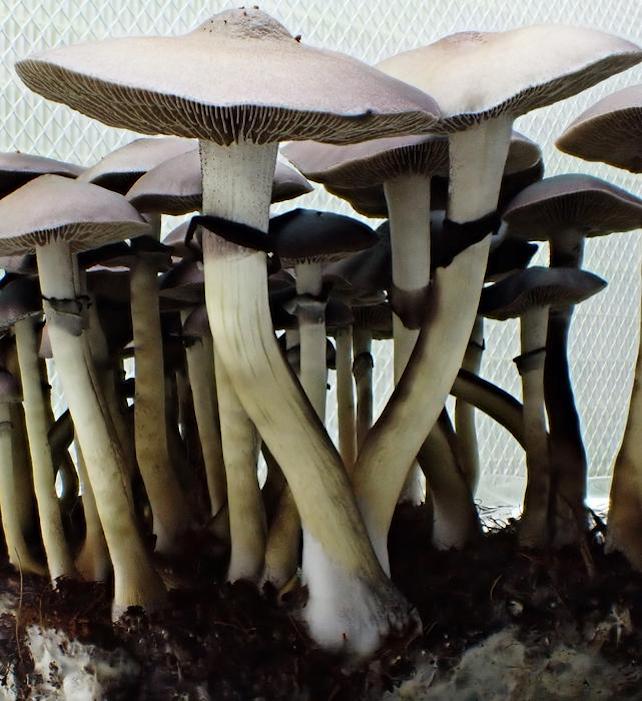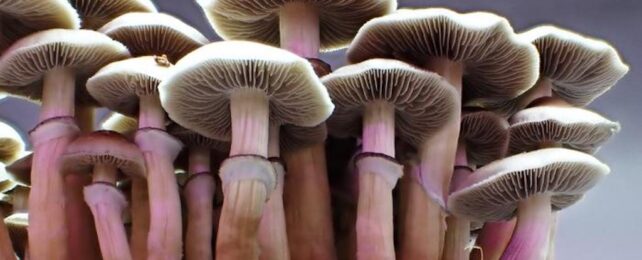Magic mushrooms can do some amazing things, from triggering vivid hallucinations to temporarily "dissolving" a person's ego and potentially even relieving treatment-resistant depression.
Humans have long marveled at these seemingly supernatural fungi, but thanks to modern genomics, we are gaining new insights about where their magic really comes from – and how we might harness it more effectively.
A new study compiled genomic data for 124 different isolates and cultivars of the psilocybin-producing fungus Psilocybe cubensis, which humans have likely used to varying degrees since prehistory.
The researchers sought to shed new light on P. cubensis, including how domestication and cultivation by humans have influenced its genetic diversity.
They sequenced genomes of 38 isolates from a population of P. cubensis that appear to have been introduced and are now naturalized in Australia, then compared those with 86 commercial cultivars of P. cubensis, whose genomes had already been sequenced.
The team from Australia and the US hoped to reveal the evolutionary history of the fungi growing wild in Australia and to learn how domestication has altered commercially available cultivars of the magic mushroom species.
Commercial cultivars showed a dramatic lack of genetic diversity, the researchers report, likely owing to the effects of domestication.
The naturalized population in Australia showed far more diversity, including unique gene variants that control production of the mushroom's active ingredient, psilocybin.
"What was surprising was the extreme homozygosity of some cultivars of magic mushroom," says lead author and mycologist Alistair McTaggart of the University of Queensland in Australia.
"Some of these cultivars have been nearly stripped of any diversity except at their genes controlling sexual reproduction.
"Whether this happened intentionally, by targeted inbreeding to fix traits over the last half century, or unintentionally through a lack of diversity to cross against is hard to know," he adds.
In lieu of financial support, the study relied on a broad community of mushroom enthusiasts who collected the samples and shipped them at their own risk and expense, the authors note.

"The trailblazers who domesticated magic mushrooms have set the stage for how we can advance cultivation and innovate with shrooms as we improve our understanding of psilocybin and its benefits," McTaggart says.
The population of P. cubensis in Australia is indeed naturalized, the study found, likely having been introduced from elsewhere and establishing itself in the wild, developing a population large enough to maintain genetic diversity.
Commercial cultivars, on the other hand, lack diversity across their genomes, the researchers report. Humans likely had a hand in that, although many questions remain about our history of cultivating magic mushrooms, including why genetic diversity fell so far.
Regardless, genetic diversity like that of Australia's naturalized population can help pull back the curtain further on magic mushrooms, offering valuable new details about what exactly they – and we – are capable of.
These results suggest the Australian mushrooms' gene variants might enable differences in the way they produce psilocybin and related compounds, the authors report, noting some intriguing implications from this kind of insight.
Their data on mating compatibility and diversity at the genes controlling psilocybin production, for example, "will advance breeding for 'designer shrooms,' in which heterozygosity of psilocybin alleles may unlock variety in the production of psychedelic tryptamines," McTaggart explains.
Humans have a long history with shrooms, and although they've been widely banned as dangerous drugs in modern times, a growing body of research is also raising awareness of their therapeutic potential, including for severe depression, anxiety, and post-traumatic stress disorder.
"Magic mushrooms are the cheapest source of psilocybin and may fill a niche in natural drug development," McTaggart says. "There is yet more to understand about how magic mushrooms produce other compounds that may impact a psilocybin experience, and this will be an exciting area of research to watch unfold."
The study was published in Current Biology.
